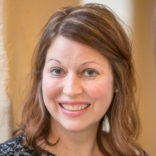In 2015, Jewish Learning Venture’s Whole Community Inclusion initiative held its first-ever training program for B’nai Mitzvah tutors on how to make modifications and accommodations for students with disabilities. Though many synagogue education programs are becoming more welcoming place for students who have learning, physical and/or developmental disabilities, not enough attention has been paid to how to best adapt the synagogues’ B’nai Mitzvah preparation process for these students. Jewish Learning Venture’s mission focuses on creating systemic change and strengthening Jewish institutions, and we realized that in our local Philadelphia community, there exists a need to train B’nai Mitzvah professionals in a way that will better support students and their families, allowing them to better integrate into the fabric of synagogue life.
Consider these very different B’nai Mitzvah students and think about whether your congregation would be able to provide the necessary supports for them – and for their families – to experience a meaningful Bar/Bat Mitzvah:
- Melissa, who has ADHD , has attended synagogue services regularly since she was a baby and has attended a supplementary religious school since kindergarten. Only when she started private tutoring for her Bat Mitzvah did her parents discover that she had never actually learned the alef-bet in school and lacked motivation to focus on Hebrew language;
- Evan is a young man who has Cerebral Palsy, resulting in some cognitive delays and visual disabilities. Evan’s challenges include limited motor control, extreme anxiety, and visual challenges. Evan’s strengths include being a strong aural learner and being invested in the Bar Mitzvah process – he is a self-advocate and is able to express to others what he needs to succeed.
- Lee and Ava are brother and sister, one year apart from each other. They both have intellectual disabilities, are on the autism spectrum, and don’t communicate verbally. They learn with a resource teacher at their congregation’s school and will use a communication device on their iPads to share their aliyah blessings at their B’nai Mitzvah.
Each of these students’ needs, as well as their families needs, are unique; there is not one approach to adapting and modifying the B’nai Mitzvah tutoring process and service for children with special needs. Because of this complex reality, we created a training for synagogue professionals that empowers them to address their students’ learning challenges and to create appropriate modifications based on both those challenges and the students’ strengths.
Over the course of two days, we shared ways to teach prayer and Torah reading and options for crafting a D’var Torah for children with diverse learning needs; we recommended ways that the tutors and clergy can invite support and information from the professionals (including speech and occupational therapists) who work with students; and we addressed the ways that the expectations and goals for B’nai Mitzvah students can be discussed in productive ways among educators, clergy, parents and ultimately the Bar/Bat Mitzvah student.
Since 2015, we’ve trained over 70 clergy, educators and tutors from our Greater Philadelphia area, Cherry Hill, New York, Washington, Baltimore and Boston. B’nai Mitzvah tutors often have no official training or peer group and part of the power was in creating a group of peer experts, some of whom have been working with students for decades. Participants shared immediate feedback about how they would return to their congregations and apply the learning from our training, including:
- This training will help me approach students who may have special needs in a way that can help make Bar/Bat Mitzvah successful for them and meaningful for their family.
- I will be better able to be an advocate for kids who need modifications.
- This training will make me more effective with a wider range of students and families.
- I will be able to increase the use of technology as an aid in my teaching.
We are excited to announce our upcoming training to be held August 5 and 6 are happy to talk with other communities about bringing our training to you. For more information or to register for the training, click here.
Note: This article originally appeared here.
Rabbi Michelle Greenfield is a 2012 graduate of the Reconstructionist Rabbinical College. She earned her BA at Brandeis University and has also taken courses in Special Education through Hebrew College and Arcadia University. Before entering Rabbinical school, she worked as an Assistant Teacher at the Kennedy Day School in Boston, a school for children with special needs. Michelle has experience working with people with special needs
in a variety of settings, including religious schools, camps, and residential facilities as well as experience training both teens and adult teachers to work with students with special needs. She’s a consultant for Whole Community Inclusion and is the Education Director for Kol Tzedek.
Gabrielle Kaplan-Mayer directs Jewish Learning Venture’s Whole Community Inclusion which fosters inclusion of people with disabilities through the Philadelphia Jewish community. She loves writing/editing for “The New Normal.” Her latest book The Little Gate Crasher is a memoir of her Great-Uncle Mace Bugen, a self-made millionaire and celebrity selfie-artist who was 43 inches tall and was chosen as a Jewish Disability Awareness & Inclusion Month Book Selection.
More from The New Normal here.
The New York Jewish Week brings you the stories behind the headlines, keeping you connected to Jewish life in New York. Help sustain the reporting you trust by donating today.





